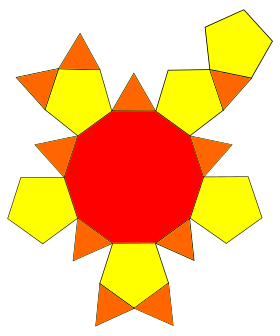Pentagonal rotunda
| Pentagonal rotunda | |
|---|---|
 | |
| Type | Johnson J5 – J6 – J7 |
| Faces | 10 triangles 1+5 pentagons 1 decagon |
| Edges | 35 |
| Vertices | 20 |
| Vertex configuration | 2.5(3.5.3.5) 10(3.5.10) |
| Symmetry group | C5v |
| Rotation group | C5, [5]+, (55) |
| Dual polyhedron | - |
| Properties | convex |
| Net | |
 | |
In geometry, the pentagonal rotunda is one of the Johnson solids (J6). It can be seen as half of an icosidodecahedron, or as half of a pentagonal orthobirotunda. It has a total of 17 faces.
A Johnson solid is one of 92 strictly convex polyhedra that is composed of regular polygon faces but are not uniform polyhedra (that is, they are not Platonic solids, Archimedean solids, prisms, or antiprisms). They were named by Norman Johnson, who first listed these polyhedra in 1966.[1]
Formulae
The following formulae for volume, surface area, circumradius, and height are valid if all faces are regular, with edge length a:[2]
References
- ^ Johnson, Norman W. (1966), "Convex polyhedra with regular faces", Canadian Journal of Mathematics, 18: 169–200, doi:10.4153/cjm-1966-021-8, MR 0185507, Zbl 0132.14603.
- ^ "Pentagonal rotunda". Wolfram Alpha Site. Retrieved July 21, 2010.




